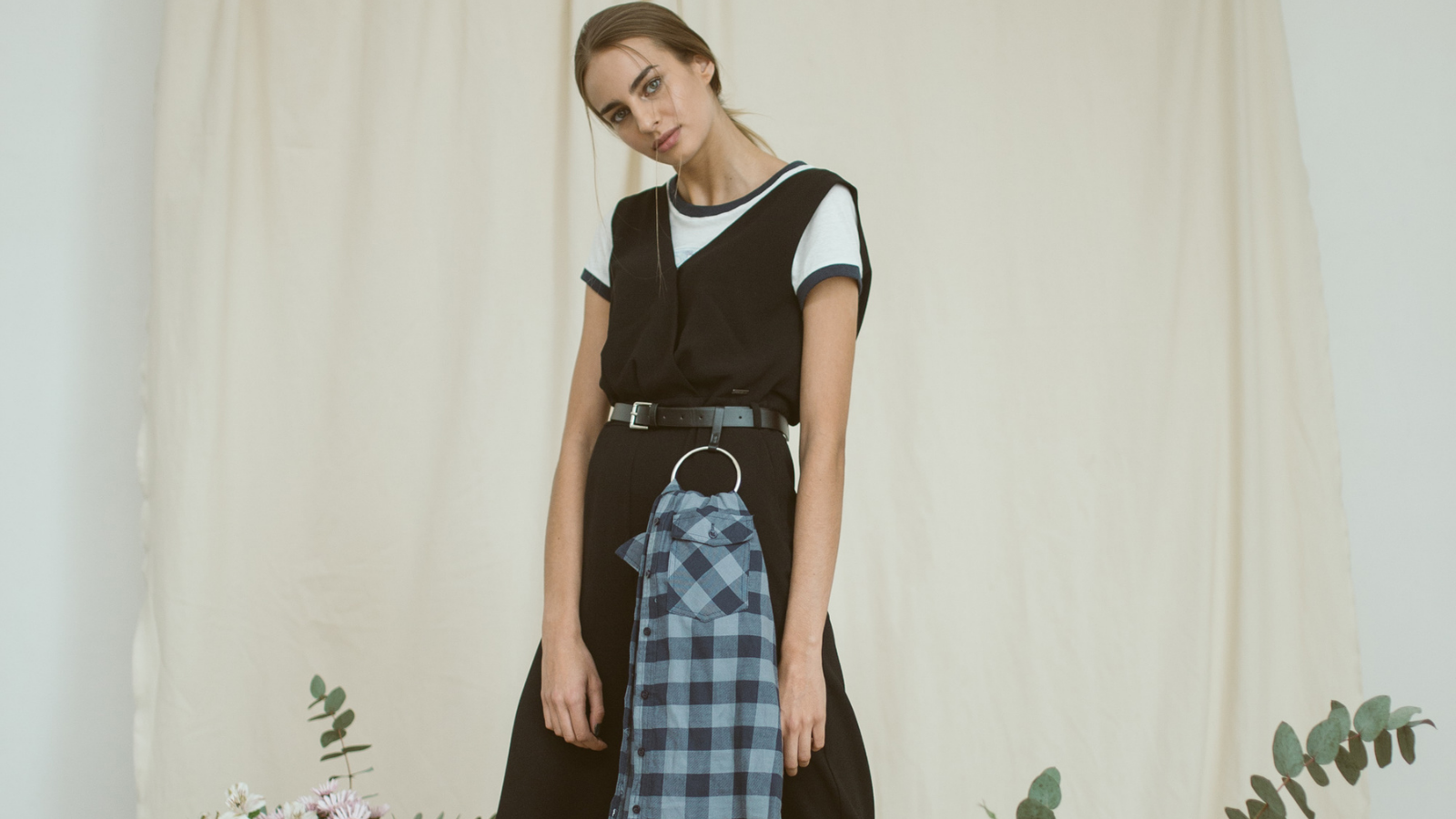Interview with Sam Burke from The Clothing Lounge
My day to day focus shifts to overseeing orders, managing our stockists and making sure everything is ship shape and floating on water.
However! This week I’ve spoken to an entrepreneur whose made it her mission to champion independent brands.
If you’re sat reading this at home and you’d love to be in fashion but you haven’t gone down the traditional uni path, landed a hallowed internship or have influential connections, panic not because Sam Burke shows us it’s never too late to follow your dreams.
As the co-founder of The Clothing Lounge, she’s built a destination for brands you won’t find on the high street. I sat down (virtually) with Sam to chat all things fashion entrepreneurialism and her story proves that not everyone’s path into fashion is a straight one. Don't forget! As always, my responses are in Italics. Enjoy!
1) Can you describe the moment when you decided you wanted to start The Clothing Lounge?
I always wanted to work in the fashion industry, but I wasn’t sure of the exact path I wanted to follow. I felt like I just couldn’t get my foot in the door, I didn’t really know where to start, what I should pursue or what was the best decision for me. Besides, it seemed like there was no proper opportunity in which I was particularly interested. In the end, I made my own opportunity and decided that it was time to go for it – so I started The Clothing Lounge. I chose to develop this platform for independent designers because I couldn’t find a platform where I could actually find a large array of emerging brands – all at the same place. I was frustrated because I’m really interested in discovering new talents, but this place didn’t. seem to exist. On top of that, emerging brands didn’t seem to get the recognition they deserved. Small independent brands need exposure to develop themselves and I wanted to provide them with that. The Clothing Lounge was born out of a need to give independent designers a voice.
I really agree with you here; if you can’t seem to find the right fit for you then you must make your own opportunity. Luckily, it’s easier than ever to do this thanks to the internet and social media. Having a go-getter, no-nonsense mentality is the key to success no matter what industry you’re in. It’s not going to be easy but it’s better than doing nothing at all.

2) What’s been the biggest learning curve you’ve had since you started the business in 2014 and what have you had to overcome?
There have been many challenges since the start of The Clothing Lounge: from the development of the website to the curation of the designers at first. It has been a long journey, but a rewarding one. I think that the biggest challenge for me was to do things in a “less is more” way. I had tons of ideas, I wanted to develop so many different aspects of the business – but it was impossible, I had to make choices. So, trying to do things in a more straightforward and simple way hasn’t been easy for me at the beginning. But I’ve learnt how to make quick and meaningful decisions without sacrificing my ideas and the developments I want for The Clothing Lounge. Once you know how to say no and you learn to focus on what you know is good for your business, you are in the right direction.
When you launch your own business, it can sometimes feel counterintuitive to reign yourself in – to think small. Yet if you don’t, you’ll run the risk of spreading yourself too thinly, your brand having no clear message and your marketing strategies to lose focus. It’s really hard! On the other hand, if your plans are set in concrete and you’re unable – unwilling – to be flexible then you’ll suffer a whole different raft of problems. Setting up a business especially in fashion is like walking a tight rope!
3) If you had one piece of advice for aspiring fashion entrepreneurs / designers what would it be? Specifically, to do with the business and financial aspect of starting a label.
I think that the most important thing is to have a precise business plan of what you want for your company – whether that is for two weeks, two months or two years. Being able to look at the future and the development you want is key. It’s important to focus on what you love and what you know will be truly beneficial to your company. Also, doing a lot of research will help you develop your skills and knowledge as well as grow your business. I think you need to be curious and to learn as much as you can, because it will never be useless. Once you know what you’re good at and what is best for you and your company, you just have to get started – this is how you will learn.

4) What were you doing before founding The Clothing Lounge and how do you think that helps with what you’re doing now?
I used to work in advertising before starting The Clothing Lounge. I loved my career in advertising, but I knew it was time for something else. The two are linked though and the skills I had to use in advertising ended up being very useful for The Clothing Lounge. Communication and good relationships have been necessary in both of my careers. When you work with clients in advertising, you have to work on your relationship with them, and today, I do the same with the designers. But all my skills from advertising have been useful – budgets, relationships, developments, everything. Thanks to my previous career, I was ready to start my own company, I knew that I had learnt enough to take the risk.
5) Are there any female entrepreneurs in the industry you admire and if so why?
One female leader I really admire is Esther Perel – I love her philosophy and share her values. She impresses me because of all her enterprises. She’s such a multitasking person and it motivates me to see women developing so many admirable projects. Her podcast Where Should We Begin is fantastic and really inspires me in many ways.

6) Running a pure play retailer is tough in the current climate and you’ve come far since the business’ birth but what advice would you give to young labels trying to generate a presence online?
Developing an online presence is becoming more and more difficult – especially nowadays with all those different channels available and a customer being less and less loyal. But I think that never compromising on authenticity is the most important thing to remember. Always follow what you believe in and trust your instincts. Never fail on integrity. I think young labels should always draw strength and positivity through negativity – this is how you grow in any industry. If you’re able to analyse negativity in the correct way, positivity will override it.
I had a similar conversation when I chatted to digital creator Lydia Tomlinson (read HERE). One of the points she made was the importance of being authentic on social media and not getting stressed out about content creation in your business’ early days. A brand’s authenticity will shine through everything they do if the audience can tell they’re having fun doing it. Authenticity also comes when you’ve created a brand or a product which solves a problem, fills a gap or meets a need - you haven't just started a company for the sake of starting a company!
7) What do you look for in brands when deciding if you want to stock them on your site or not? And how important is social media following in making your decision?
Choosing a brand is a very long and tough process. There are many factors that are taken into consideration – criteria can really differ depending on the brand. But all the brands we represent have this thing in common: they are honest and transparent in their supply chain. We need to fully understand their values, their perspective on the future of the industry, as well as their engagements. Of course, the brands also need to be physically capable of producing high quality products that our customers will be able to keep for a lifetime – no matter if it’s a piece of clothing, an accessory or any other kind of fashion item.
8) And finally, you can raid anyone’s wardrobe – dead or alive – who would it be?
There
would so many! But if I had to choose just one, I would say Beyoncé’s. Her
ability to feel powerful and feminine at the same time is unique. She gives
women empowerment and her clothes are part of that achievement. Besides, her
wardrobe is so eclectic, I admire her for being able to sport so well so many
different styles.
So, to round it off, what are the most important things every aspiring designer and fashion entrepreneur should bear in mind before they start their company?
5 THINGS YOU NEED TO KNOW BEFORE STARTING A FASHION COMPANY
1) Research. Research. Research.
Make sure you know the market you want to go into inside out; who are the leading brands? What’s their pitfalls? How do they market themselves? Whether you want to be a part of fast fashion, sustainable luxe or haute couture, you can’t skip the initial research stage.
2) Authenticity
There’s a plethora of brands out there and at the beginning it will feel like you’re swimming in a ripe tide trying to get yourself heard. Yet, the brands that last all have one thing in common – authenticity. Really believe in what you do and shout it from the rooftops!
3) Play to your strengths!
It may sound clichéd but you’ll have a far better chance of success if you know your strengths and can play to them. If you’re fantastic at design but number crunching isn’t your thing you need to outsource. Always be honest with yourself about your weaknesses and know when you need to ask for help.
4) Plan!
Running a business on a wing and a prayer is only a good story when it goes well. Having a basic plan – even if it’s not set in stone, will give you goals to strive for and ease the bumps which come along the way.
5) Draw on your previous experiences
Nothing is irrelevant so use every lesson learnt from your past into your business. Whether it’s learning how to foster and maintain relationships like Sam or reapplying practical skills like copywriting, everything will be beneficial even the moments you failed.
I hope you found our latest article in our fashion entrepreneurialism series, if you haven’t already check out our other interviews with digital creators, beauty directors and fashion entrepreneurs. As ever, follow us on social (@tamara_harvey_official) and take a look at our collection with The Clothing Lounge HERE

